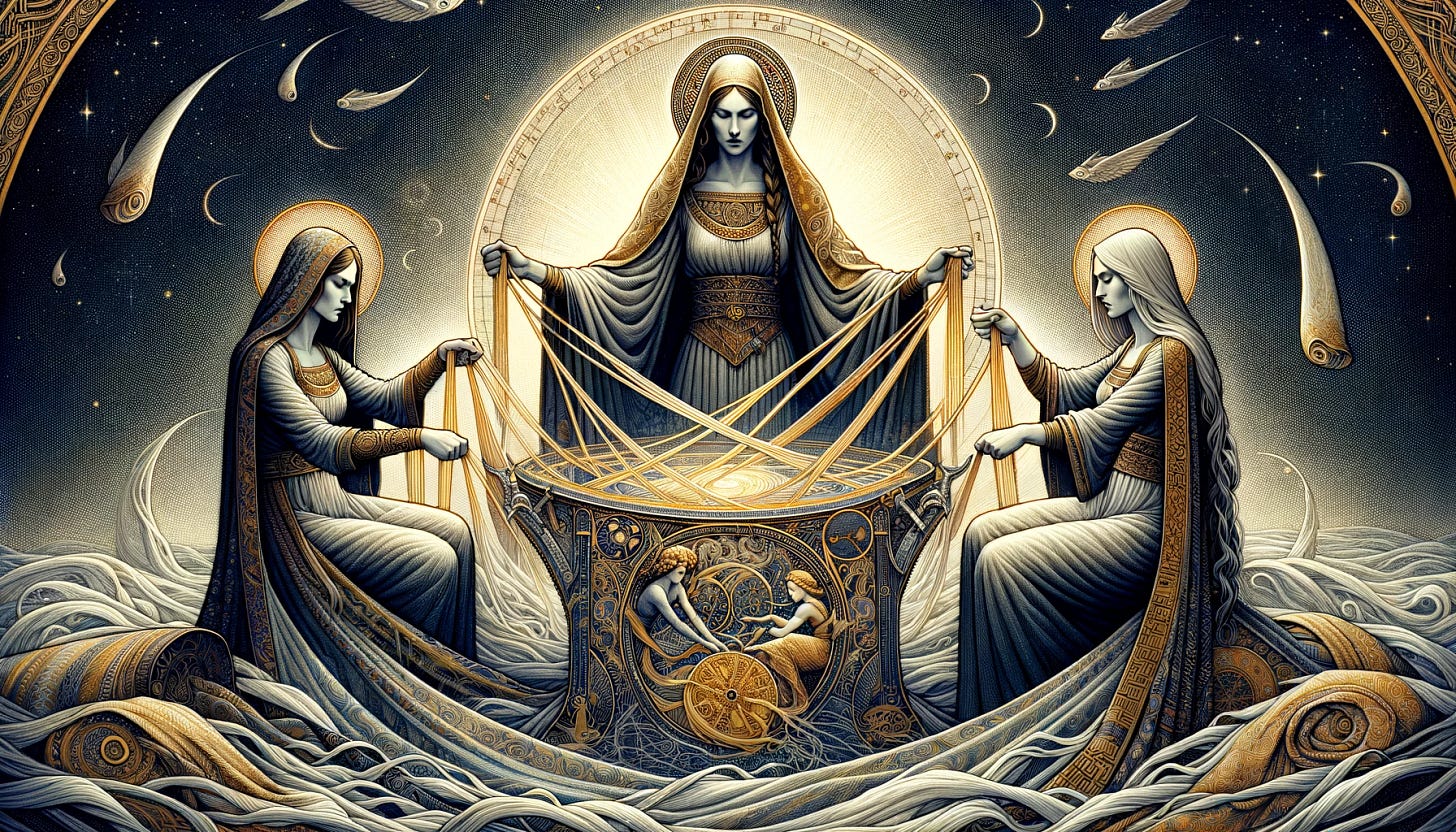Wyrd: The Tapestry of Fate in Viking and Anglo-Saxon Mythology
Wyrd is a concept roughly corresponding to fate or personal destiny. The word is ancestral to Modern English weird, whose meaning has drifted towards an adjectival use with a more general sense of "supernatural" or "uncanny", or simply "unexpected".
The term wyrd in Old Norse is urðr, with a similar meaning, but also personified as a deity: Urðr (anglicized as Urd), one of the Norns in Norse mythology. The word also appears in the name of the well where the Norns meet, Urðarbrunnr.
The concept of wyrd is deeply entrenched in Norse mythology.
It offers a different way to understand fate and its interweaving with the fabric of human lives. This ancient notion, though originating well over a thousand years ago, continues to hold relevance and offers insights into the human condition, both in historical and contemporary contexts.
The Essence of Wyrd
Wyrd, in its essence, represents a nuanced understanding of fate. Unlike the linear and fixed perception of destiny in many modern Western societies, wyrd embodies a more fluid and interconnected view. It suggests that the fate of individuals is not merely a series of personal events but a dynamic interplay of actions, choices, and the actions of others as well as the inevitable consequences of all those actions.
In Viking mythology, wyrd is often depicted through the Norns, three powerful beings who dwell at the well of Urd beneath the world-tree Yggdrasil. They weave the destinies of men and gods alike, intertwining the past, present, and future into a single, mutable fabric. This imagery powerfully conveys the notion that while some aspects of one's destiny might be fixed by the society around us, others are subject to the individual's actions and decisions.
Similarly, in Anglo-Saxon mythology, wyrd manifests through the belief in an interconnected world where humans, nature, and the spiritual realm are inextricably linked.
Celts, as we call them, also perceived life as a continuous cycle of birth, death, and rebirth, governed by forces that could be influenced but never fully controlled. This worldview highlights the importance of harmony with the natural and spiritual worlds, suggesting that one's fate is not only a personal journey but also part of a larger, cosmic pattern.
Practical Applications Then and Now
A Thousand Years Ago
The concept of wyrd had practical applications in everyday life and decision-making. It fostered a profound respect for the forces of nature and the divine, encouraging individuals to live in harmony with the world around them. Warriors drew courage from their belief in wyrd, entering battle with the understanding that their fate was part of a larger destiny. Similarly, leaders and rulers sought to align their actions with the perceived will of the gods (later, God), hoping to ensure prosperity and avoid disaster.
Wyrd also played a crucial role in social and ethical norms. The belief that one's actions could influence a wider fate underscored the importance of honor, loyalty, and the consequences of one's deeds. This instilled a sense of responsibility and accountability, guiding individuals to consider the wider impact of their choices on their community and the world at large.
In Contemporary Times
Although separated by a millennium, the concept of wyrd still holds significant insights for modern life. In an era characterized by rapid change and uncertainty, the idea that our lives are part of a larger, interconnected web of fate resonates with many seeking meaning and purpose. Wyrd challenges the modern emphasis on individualism and control, reminding us of the limitations of our power and the importance of our connections to others and the natural world.
Moreover, wyrd offers a valuable perspective on dealing with adversity and the unknown. Recognizing that our paths are shaped by a combination of choice, chance, and the actions of others can foster resilience and flexibility. It encourages us to focus on what we can control—our actions and responses—while accepting the unpredictability of life.
The ancient concept of wyrd, with its rich imagery and profound implications, bridges the gap between past and present, offering timeless wisdom on the nature of fate and our place within it.
By embracing the interconnectedness of all things and recognizing the role of personal responsibility in shaping our destinies, we can navigate the complexities of modern life with a clearer understanding of our contribution to the weave of lif.
In this way, wyrd continues to weave its threads through the ages, connecting us with our ancestors and reminding us of the enduring human quest to understand our place in the universe.
We are part of a great tapestry. Now that’s truly weird.





